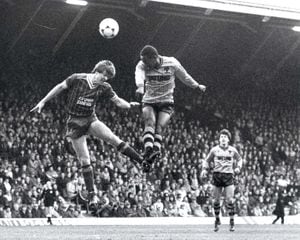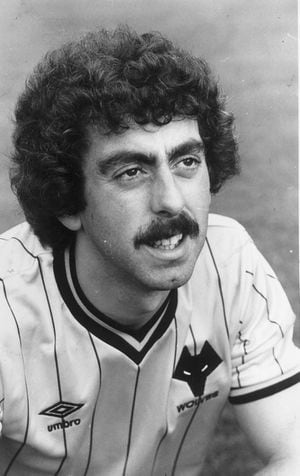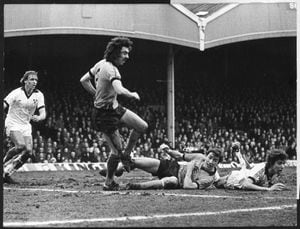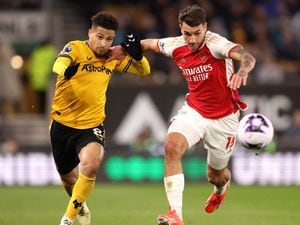From fan to a Molineux great, Geoff Palmer played in every division for Wolves
There was a time when Wolves just didn’t win at Anfield.
Thirty-three years to be precise, in a 21-game streak following a 4-1 win in 1950 which included just three draws, and 18 defeats, writes Paul Berry.
At one point Wolves went seven successive visits without even troubling the scorers.
The modern-day team heading to Merseyside to tackle Liverpool on Sunday know they are in for a tough test given the hosts have gone 64 unbeaten at home in the Premier League.
Quite the challenge.
But surely, the odds on an away win will not be as long as they were the day that long and miserable sequence came to an end during a season which proved the catalyst for Wolves’ dangerous descent from top division to bottom, and almost oblivion.
January 14th, 1984.
All conquering Liverpool, enroute to a third successive league title and treble of league, League Cup and European Cup, welcome basement boys Wolves, a team which had barely strengthened since winning promotion to the top flight, now languishing comfortably adrift at the foot of the First Division.
“Even now, I can remember going up to Liverpool and the chat around our pre-match meal,” recalls Geoff Palmer, who by that time was a decade into a Wolves career that had already seen enough ups and downs to rival any of the most daring attractions at a theme park.
“We knew what was ahead, and in the team talk we were saying we could be proper coupon busters that day - we were even having a laugh and a joke about it.
“This was Liverpool, with the players that won so much at the top of the game in the Seventies and the Eighties.

“The likes of Grobbelaar, Neal, Lawrenson, Hansen, Rush, Souness, they were all in the team that day.
“We had a team with a little bit of experience, but also a lot of young kids, who had barely played many games at all in their careers so far.”
And so, of course. Liverpool 0, Wolves 1. Young striker Steve Mardenborough, with the only goal of the game, which would also be his only goal for Wolves, from a sum total of 11 appearances.
Ten minutes in, the goal arrived, and it was “backs to the wall” for the majority of the other 80. But ultimately, a truly famous victory was achieved and standing ovation delivered not just by the hardened travelling faithful but also a Liverpool fanbase who probably couldn’t quite believe what they had just witnessed.
“We only went out and beat them,” laughs Palmer.
“And yes, we did ruin all those coupons!
“I think it was a cross from Danny Crainie which went in off Steve’s shoulder, and after that it was pretty much backs to the wall for the rest of it.
“We had Budgie (John Burridge) in goal, and he had to make a few saves, but it was one of those games where we got bodies in the way, blocked shots, kicked a few off the line.
“And as the game wore on, especially in the second half, we actually got better!
“We were also having that much luck that we just started to think that it really wasn’t going to be Liverpool’s day.
“Playing against Liverpool you expect to be given a run-around, and we had that and had to test our luck a little bit and sometimes in those situations it comes off and sometimes it doesn’t.
“Sometimes you can go up there and get a right ‘tatering’ but it was one of those days where everything came off for us.
“We did have a lot of young lads in the team, in Danny, Steve, John Humphrey, John Pender, Sammy Troughton.
“Maybe because we were in such a precarious position, we were a little bit naïve and didn’t think too much about the aura surrounding Liverpool and we were able to stand up to them.
“That standing ovation after we came off after winning 1-0 at Anfield, well, that was probably one of the best feelings I ever had after an away game for Wolves.”
Wolves had already drawn 1-1 with Liverpool at home on the first day of that season.
Fresh from an exciting promotion from the Second Division under Graham Hawkins, Palmer slammed home a second minute penalty despite the usual shenanigans from Bruce Grobbelaar, for what was the first goal scored of the newly sponsored Canon League.
Sadly he didn’t receive a free camera or similar audio-visual item to furnish the Palmer residence as a result!
Wolves actually had a decent record against Liverpool in those days at home, at one stage going six unbeaten including dishing out a 4-1 drubbing in November of 1980.
And even though it took another 23 years to win away at Liverpool – more this time due to travails outside of the top division – that remarkable success of ’84 was actually the first of three wins in six visits to Anfield.
That win on the road, one of just two away successes that season along with an equally memorable afternoon at West Bromwich Albion, offered a rare moment of respite from the launch of Wolves’ dramatic downward spiral.
All far cry from the club Palmer was first introduced to as an ambitious and wide-eyed Cannock lad with fierce ambitions to represent the hometown club he had supported as a boy.
An apprentice during the club’s run to the UEFA Cup Final of 1971/72, which included carrying out various duties around the first team, Palmer made his debut in the League Cup win at Halifax in October, 1973.
Five months later, he was on the pitch at Wembley as a 19-year-old as Wolves beat Manchester City 2-1 to win the competition, having featured in every single round, and England Under-23 honours would also follow.
Six years later he was back at Wembley again, one of a quartet comprising John Richards, Kenny Hibbitt and Derek Parkin to have featured in both of Wolves’ League Cup final victories as Nottingham Forest were upset under the Twin Towers.
There was a relegation in between, followed by an immediate return via the Division Two title, as well as a couple of FA Cup semi-finals in what had been Wolves’ most successful spell of recent times prior to the current squad now knocking on the door.
“I am from Cannock, my team is Wolves, so it was amazing for me to come through and turn professional and play for the club which I had been watching from the terraces growing up,” Palmer recalls.
“It happened really quickly, playing in a League Cup final at 19, but if there were any nerves I always knew the other lads would help me settle.
“What Mr McGarry did which I thought really well was to introduce young players one or two at a time, and that meant he knew the experienced lads would carry them through.
“Mick Bailey – everyone knows what an inspirational fella he was at Wolves – he helped me, and then Squeak (Derek Parkin), Scouse (John McAlle) and Frank (Munro) at the back.
“They would all guide you on the pitch, and just tell me to go out and play my normal game.
“Then you look at the midfield over the years – Mike, Hibby (Kenny Hibbitt), Dales (Steve Daley) and Willie Carr – Waggy on the left, John and the Doog scoring goals up front, we had some really good players.

“Not just good players though, great lads as well, and we were one big happy family who had some great fun along the way.
“I made friends for life, and when you look at that team so many of those who came to play for Wolves have stayed on and lived in the area ever since.
“Dales lives around the corner from me – not too sure how I really feel about that! – and then I am still in touch with so many others as well, including on the committee of the club’s Former Players Association.
“It really was a great place to be during those years, and we got on so well, and would stick together through everything that happened.”
What has also endured about that group from the Seventies and early Eighties, along with their memories, has been their humility.
It was a team put together with very little finance – even the British record fee for Andy Gray was only splashed out because a similar amount was coming in from Manchester City for Daley – and they certainly never got carried away.
“With Bill McGarry there was never any chance of getting carried away anyway!” says Palmer.
“There were some characters though, like Lofty (Phil Parkes) and Dales, and Danny Hegan.
“Dales, everyone knows what he’s like, he just couldn’t sit down before a match and would be going around everyone having a joke.
“Then you’d have someone else sat quietly reading the programme, Waggy having a fag, people did different things to prepare.
“But once we went out it was to play football with one aim, to win the match.
“I think for any manager to bring 11 blokes from different parts of the country to do as well as we did is a masterstroke.
“It’s been nice that with the success Wolves have had in recent years people have started to remember our team as well.
“When they talk about Wolves now finishing seventh and that’s as good as since we finished sixth I remember I was part of that team.
“When they mention the last major trophy being the League Cup win against Forest in 1980 I think, ‘I played in that game’.
“And when they were chatting about Conor Coady trying to break the appearance record set by Phil Parkes I am thinking, ‘I played in front of him, he’s my mate’.
“Records are there to be broken and hopefully one day they will be the way this team have been doing.
“But it’s nice to be remembered for what we achieved back in the day, and gives us something we can relate to.
“People sometimes ask me if I wish I was playing now, that I could have been a multi-millionaire.
“My reply is always that what I have never had I am never going to miss am I?
“We never got above our station, that was just how we were, and we let our football do the talking.”
Palmer himself followed that adage and is well remembered by the Molineux faithful, not just for some fairly combative tackling but also the magnificent perm and moustache combo which characterised part of his time at the club.
His 496 appearances in two spells puts him at eighth in the all-time Wolves stakes, and his 15 goals included several from the spectacular category, right from his very first which was despatched past Pat Jennings and Tottenham at White Hart Lane.
“Thank goodness for You Tube giving me the chance to show the grand-kids’ stuff like that, I wasn’t just a clogger you know,” Palmer says with a laugh.
There was one free kick at Burnley which also earned Palmer the nickname ‘Zico’ in tribute to the Brazilian playmaker and set piece specialist.
The nickname has stuck – it’s fair to say Palmer has probably been called a whole lot worse!
He also shares another Molineux landmark with midfielder Paul Dougherty which is perhaps more bittersweet: The only two players to have represented Wolves in all four divisions.
And that is, of course, down to the sad Wolves decline before and after the promotion under Hawkins and almost took the club out of the league both via performances and financial issues which reared their head both in 1982 and 1986.
Palmer acknowledges that the 1979/80 team which finished sixth and lifted the League Cup was an ageing one which was always going to need a reboot, some refreshing and reshaping for Wolves to continue to progress.
He even remembers discussing that very scenario with Parkin.

It was just that the execution of the plan didn’t really match its necessity. Not even close.
“Sometimes you do have to break a team up as everyone gets older and we knew that time was coming and that players were going to move on,” says Palmer.
“But what happened was that players left, and they weren’t properly replaced.
“Young lads were coming in who had talent but were never going to be consistent enough, and there was a lot of pressure on their shoulders.
“We got relegated and then Graham Hawkins got us back promoted but even then, the gap between the top two divisions was as big as it is now, and the club needed to spend.
“We went with the same team, which wasn’t enough, and you could just see the decline kicking in without being able to do anything about it.
“Then you see the Castlecroft training ground being shut down, and think, ‘hello, what’s going on here then’, and the takeover with the Bhatti’s and the Doog and results just plummeted.
“It didn’t help obviously that we were losing most weeks, which is a habit that you get into, and is very difficult to get out of.
“The club just wasn’t a nice place to be at the time, it wasn’t being run properly, and was on its knees.
“Even after that win against Liverpool, we then lost to Luton the following weekend, and in truth, we just weren’t good enough.”
Palmer is a proud man, and was a proud captain, even during those dark and dismal days, and did all that he could to stem the tide.
Tommy Docherty’s arrival saw him out of favour and off to Burnley for ten months, which he enjoyed, but he was still more than happy to return and achieve that feat of figuring in all four divisions.
Towards the end at Molineux he was helping Brian Little with the coaching, as well as taking the youth team on a Saturday morning.
Little, whose brief caretaker reign was ended by the appointment of Graham Turner, was still keen on Palmer staying available if required, and so it was that he replaced Darren Oldroyd for one final swansong in Wolves’ colours.
Andy Mutch’s goal secured a 1-0 win against Preston in front of a Molineux gate of 4,479, completing a low-key swansong for a Wolves hero who had been through a gamut of emotions during 16 years at the club.
“It’s only myself and Pee Wee (Paul Dougherty) who have played in all four divisions for Wolves, and I have seen it all from winning cups at Wembley to relegations, low attendances and half the ground being closed,” he says.
“But the good times definitely outweigh the bad, and I will always feel extremely proud of what I achieved at Wolves.”
By the moment he walked off Molineux for the very last time, he already knew he was destined for a new and very different career as a Police officer.
As many people will know - hopefully from reading about it rather than personal experience - PC Palmer was soon to step forward on the beat.
Regular conversations with a police sergeant pal over a weekly game of snooker had sown the seed for Palmer to join the thin blue line, with the added bonus of being able to continue playing football.
Although it nearly didn’t get off the ground as, having already been granted time away from Wolves to take some exams, Palmer embarked on the 14-week training course at the College of Policing in Ryton On Dunsmore.
“On the first Sunday night before the course started, I picked up a mate from Cannock, who was also on the course, and he was wearing his full uniform, while I was in a tracksuit,” he recalls.
“When we got there, and I walked into the big hall to sign in, one of the senior bobbies came up and said: ‘can I give you a tip’?
“’Go and put your ****** uniform on’!
“Then I was shown to a desk where a sergeant greeted me with ‘so this is our famous footballer then’ and I was thinking ‘here we go’.
“I was shown to my room in the quarters, which was literally a bed, couple of blankets, and an A4 sheet I had to fill with information to introduce myself the next day.
“I put my holdall on the bed, sat down and thought, ‘I don’t think this is for me’, and was within a whisker of going out to the car park and driving straight home.
“For whatever reason I didn’t, and it was one of the best decisions I have ever made to stay.
“I went on to spend 24 years as a police officer, and I really enjoyed it.”
Based at Walsall, Palmer also worked at times with former Wolves team-mate Hugh Atkinson, and whilst more than happy to remain as a PC, he did spend several months on attachment with the CID, as well as attending a Scenes of Crime course.
Very early starts, and night shifts sometimes sapped the motivation levels, but on the flipside Palmer was able to carry on playing football, which included not just turning out for West Midlands Police but the British Police, and appearances at both Ibrox and Celtic Park, stadia he hadn’t previously graced during his career.
Palmer also found that his footballing history sometimes came in handy in diffusing volatile situations.
“I always remember once I was on an afternoon shift in Darlaston and myself and a colleague were called out to a domestic where a couple had been having an argument,” he says.
“We got there to see that there had been a verbal argument and the fella was under the influence and had thrown his dinner up the wall with the gravy and the spuds dripping down.
“We were calming the situation down and all of a sudden the bloke went quiet. ‘Is that you Geoff?’ he asked me. ‘What the bloody hell are you doing here’?
“My colleague told him that I wasn’t in fancy dress!
“It helped diffuse the incident and there were other scrapes where people had been fighting and all of a sudden it would stop and they would tell me they had watched me for years and end up asking for an autograph!”
From signing autographs to signing off, after finishing with the police force Palmer spent a couple of years working for Mercedes delivering cars to customers who had purchased online, but is now, at the age of 66, officially retired.
Still attending Wolves games, pre-pandemic at least, Palmer can regularly be found on the golf course, particularly at Oxley Park, whilst also spending time with his six grandchildren.
The memories are never too far away.
Parkes, Palmer, Parkin, Bailey, Munro, McAlle. Fans still reel off the names with metronomic accuracy of what was such a settled and consistent ‘1 to 6’ in those heady days.
Add into that Hibbitt, Carr, Daley, Wagstaffe, Richards, Dougan, and so many more.
All revered and loved for their efforts for Wolves during the most successful recent period the club had enjoyed until the current model started to threaten the upper reaches of the top division.
Still their heroics are only now being matched, and Palmer was a part of the most recent Wolves team to win at Arsenal, in 1979, before Sunday’s well-earned victory at the Emirates.
Palmer now hopes that Wolves can follow in their footsteps and lift a trophy to back up the promising league finishes and cup runs at home and abroad, and secure their own place in the Molineux history books.
Nearly 500 appearances after progressing from fan to player, trophies in the cabinet, a penchant for the spectacular goal or two but above all, never-ending reserves of character to deal with everything that life at Wolves could throw at him…Palmer certainly deserves his own place in Molineux folklore.
Remembered for his contribution to a fantastic period in the club’s history and, even at the start of one of the worst, one special afternoon at Anfield.





